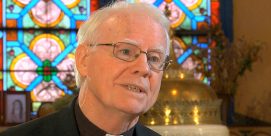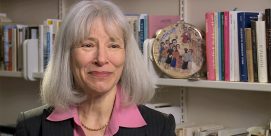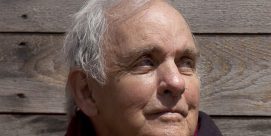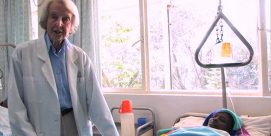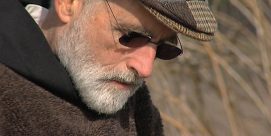“I see it all the time,” says Father Michael Doyle, a Roman Catholic priest in Camden, New Jersey, “a beauty that’s deep and wonderful and sometimes tragic, but beauty absolutely, I do. Their faces are there with their burdens and their wrinkles and their difficulties and so forth, but beauty that’s just jumping at you. More
“Any ritual should have the capacity to deepen your mindfulness,” says University of Virginia professor Vanessa Ochs. It helps you “deal with the chaos of life.” More
After almost 20 years of distinctive coverage of religion on mainstream television, Religion & Ethics NewsWeekly is coming to an end. In its last two episodes, the series looks back at some of its most memorable reports and interviews. This … More
“What makes me a believer,” says writer Frederick Buechner, “is that from time to time, going back almost as far as my memory will go back, there have been glimpses I had, sometimes literally a glimpse, which have made me suspect the presence of something extraordinary and beyond the realm of the immediate.” More
“In the last 20 years,” says correspondent Tim O’Brien, “we’ve seen five vacancies on the Supreme Court and changing attitudes on a wide range of social issues. Times do change, and so do the justices. For better or worse, what the Constitution really means would seem to have changed over the years right along with them.” More
“Many of my stories have concerned human suffering,” says correspondent Fred de Sam Lazaro, “and one of the most effective ways to tell these is through the work of social innovators and entrepreneurs, many driven by deep faith.” More
“I think the purpose of the monastic life in the modern world is to show that we don’t need a purpose,” says Brother Paul Quenon of Gethsemani Abbey in Kentucky. “The purpose of life is life, and you are to be just to be. Everybody measures their importance by how useful they are. That’s not it. That’s not what life is.” More
Kansas classrooms are using mediation skills and restorative justice circles to resolve conflicts peacefully; Catholic seminarians travel from Minnesota to Calcutta to serve the poor and suffering the way Mother Teresa did; and a Texas imam visits Syrian refugee camps … More
“Conflict is a part of human experience,” says Wichita West High School psychologist Janet Fox Peterson, “and teaching about speaking and listening is so very critical, and we’re not working on that very much as a society.” More
The sisters don’t go out and try to fix the society,” says seminarian Peter Ludwig. “They really embrace the culture that they’re in, find people, the absolute poorest of the poor. It’s what’s so different about Mother Teresa. She doesn’t go and try to fix all the problems in the world. She goes out to love, to bring love into the problems of the world.” More
Religion & Ethics NewsWeekly
X


